When Lawyers Break the Rules… The Code of Conduct for Florida Attorneys

We all break various rules and laws from time to time, in fact, many of us break a law or two almost every day. Exceeding the speed limit while driving comes immediately to mind, but there are others as well.
For the most part, the laws most of us break on occasion would have to be considered fairly minor infractions, and the reason we break them willingly is because we don’t think we’ll get caught. It’s not the severity of punishment that deters criminals from breaking laws… it’s the certainty.
Getting a speeding ticket for driving 90 miles per hour can be, as punishments go, fairly severe… the fine alone can cost hundreds of dollars and the impact on our insurance premiums can be similarly burdensome. Get two or three such citations for speeding during the course of a year and the costs could mount into the thousands. A few more, and we might lose our license to drive. And yet, even so, many still think nothing of ignoring the speed limit almost every time behind the wheel.
But, consider what happens when we see a highway patrol car on the side of the road? We slow down immediately… like an involuntary reflex…. even when the patrol car is on the other side of the highway. We clearly do not want to get caught. We’re only willing to break the speed limit laws when we perceive the odds of getting caught to be low.
What if every time our speedometers exceeded the speed limit while driving, we heard a “Ding!” and a citation for speeding simply printed out of our dashboards. It wouldn’t have to be a very expensive citation, maybe only $5 would do it… and most of us would change our driving habits in a hurry. Not because of the severity of the punishment for speeding down the highway… but because of the certainty that we would be caught and punished… every single time we broke that law.

A Higher Standard…Â
Most of us are only concerned about living within society’s laws, but certain professions impose a higher standard on their members… doctors and lawyers come immediately to mind, but there are others as well, such as police officers, investment professionals, educators, interpreters, pilots, members of the clergy, and even journalists… all are supposed to adhere to a code of conduct beyond society’s laws and rules.
Some professions, including both the legal and medical, require individuals be licensed, and breaches of the profession’s code of conduct can result in suspension of the applicable license on a temporary or sometimes permanent basis.
Perhaps the most widely known rule we count on certain professionals to follow, is one that both the legal and medical professions consider sacrosanct… privileged communication.
The doctor-patient privilege means patients can be assured that they can fully disclose information to their doctor without fear of anyone finding out what they’ve disclosed. If the physician-patient privilege didn’t exist, patients would be more likely to give doctors incomplete information, which would make it difficult or dangerous for the physician to do his or her job..
The Legal Profession…
Privileged communication is a private statement you make that must be kept in confidence for your benefit… and privilege belongs to the client, not the attorney, and hence only the client may waive it.
A fundamental construct of our judicial system, the attorney-client privilege can be traced back to its origins in Roman law. It exists in law, for similar reasons as it does for the physician.
Clients must feel safe discussing all aspects of a case without fearing their attorneys will be called to testify at trial and asked to repeat their private statements. Conversely, to retain the client’s trust and do his or her job properly, an attorney must be allowed to withhold private communications with his or her client from the court and the opposing party.
In general, the Professional Code of Conduct that applies to attorneys is cemented in place to protect the underpinnings of our democracy. Â
I know a lot of lawyer jokes.
Q: Why does New York have 100 toxic tort lawyers & New Jersey, 100 toxic waste dumps?
A: New Jersey got first choice.
Hahaha. Funny, right? Sure, lawyer jokes can be funny, until something happens to us… we get seriously injured… cheated in a business deal… divorced… sexually harassed and fired… foreclosed on improperly… or worse… arrested for a crime we didn’t commit. When any of those things happens, we stop making fun of lawyers and thank God when one shows up to help us.
I’d imagine that in truth, along with occasionally being the punchline of a joke… lawyers get quite a few hugs. The fact is, when we need a lawyer… we really need a lawyer.
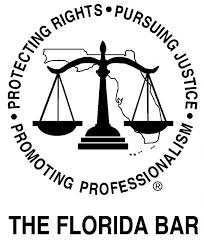
A FLORIDA’S RULES OF PROFESSIONAL CONDUCTÂ
… for Attorneys Licensed to Practice in Florida.
The Florida State Bar has its own Rules of Professional Conduct for attorneys licensed to practice law in the Sunshine State. And lawyers that ignore the standards of conduct do so at their own peril, because as it says in the introduction…
“A license to practice law confers no vested right to the holder thereof but is a conditional privilege that is revocable for cause.”
It’s the Florida Supreme Court is empowered to set the standards of conduct for lawyers, decide what constitutes grounds for discipline, and revoke the license of lawyers “whose unfitness to practice law has been duly established.”
The Florida Bar’s board is responsible for “maintaining high ethical standards” for the state’s attorneys, along with, “conducting disciplinary proceedings in accordance with the provisions of these rules.”
What follows are  rules excerpted from Florida’s rules for lawyers…Â
This past week, after I wrote about the Figueroa v. Szymoniak lawsuit, which alleges that Lynn Szymoniak, an attorney licensed to practice law in Florida, at the very least committed numerous significant ethical violations in her representation of Damian Figueroa, and it could be much worse than that.
Her response was to say that the retainer agreement that she sent Mr. Figueroa in order to represent him did not include the words, “False Claims matter,” and therefore, she was not representing him in a Qui Tam suit filed under the False Claims Act.
Numerous emails between Szymoniak and Figueroa over about a six month period show that her client certainly thought otherwise, and according to all of the attorneys that contacted me after reading the article, what DAMIAN thought is all that really matters… and the emails make it clear what he thought was going on.
But, they also show that she knew too.
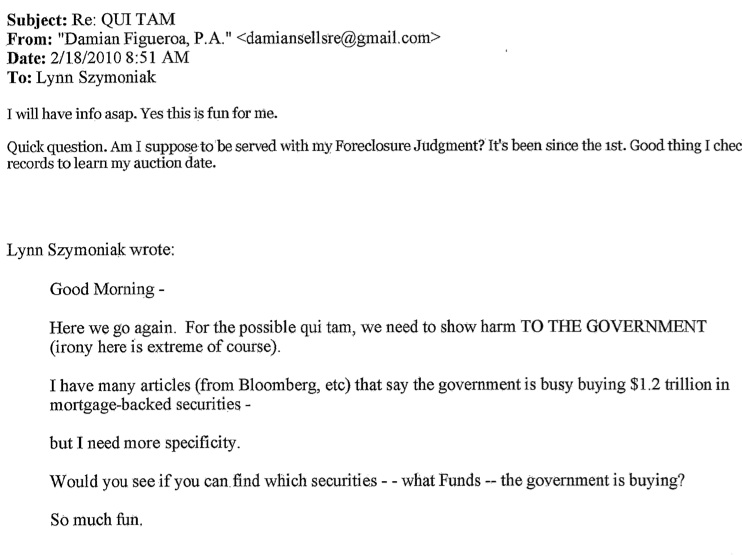
Just as a quick recap, Szymoniak, after asking Mr. Figueroa to send her a plethora of information and data on how the government was being defrauded, ended up telling Mr. Figueroa that she couldn’t find anyone interested in filing a Qui Tam suit… while she was secretly in the process of filing her own Qui Tam suit, which it appears depended on a significant amount of his work product, and was ultimately filed in South Carolina in early June. Â
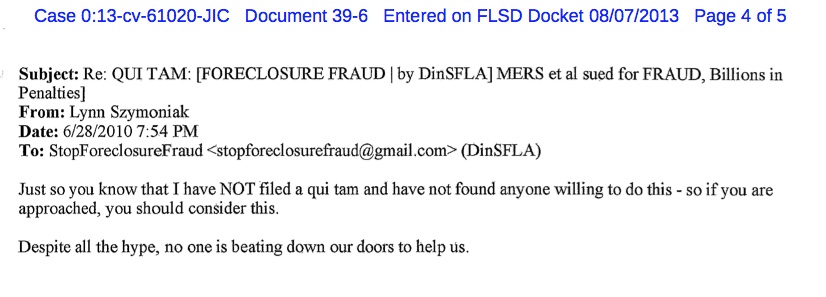 In 2012, Szymoniak received an $18 million award for her supposed role in the lawsuit filed under the False Claims Act, when the government settled the case with the four largest banks, Bank of America, Wells Fargo, JPMorgan Chase and Citibank.
In 2012, Szymoniak received an $18 million award for her supposed role in the lawsuit filed under the False Claims Act, when the government settled the case with the four largest banks, Bank of America, Wells Fargo, JPMorgan Chase and Citibank.
She claims she owes Mr. Figueroa nothing and did nothing wrong, telling reporters that she expects the suit to be dismissed soon. I can say this… I’ve heard from at least 50 attorneys and she’s the only one who thinks so.
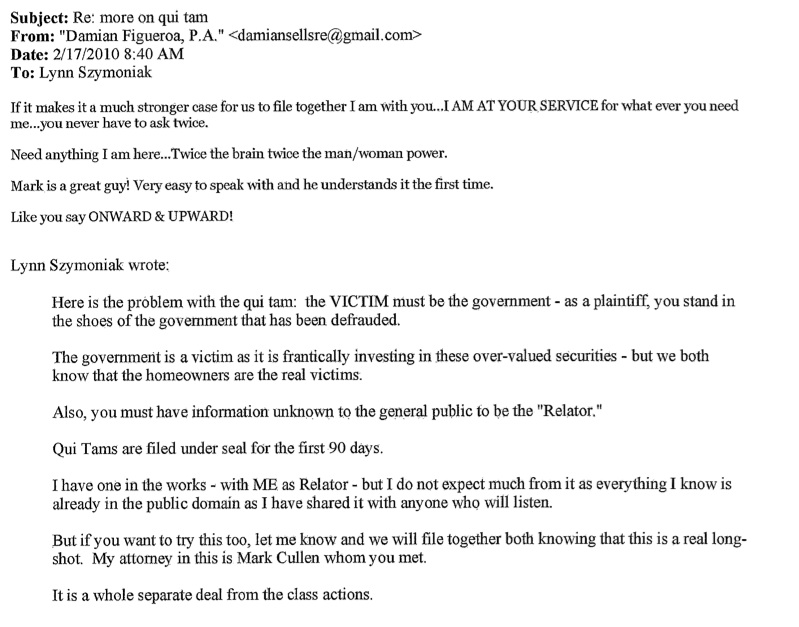
There’s no question about whether Szymoniak was representing Mr. Figueroa’s beginning in mid February of 2010 and at least until July 8, 2010, when she explicitly told Mr. Figueroa that she had not filed a Qui Tam, having not been able to find anyone interested in filing the suit. In truth, when she sent that July 8th email, she had filed her suit over a month before.
So, what does the Florida Bar’s Rules of Professional Conduct have to say about Szymoniak’s representation of Mr. Figueroa, as viewed in light of the emails between the two, over that six month period when Szymoniak was Damian’s lawyer back in 2010?
EXCERPTED FROM FLORIDA’S RULES OF PROFESSIONAL CONDUCT
(This edition compiled by the Legal Information Institute editors reflects all amendments reported at the Florida Bar Web site through July 1, 2002.)
Withholding information…
A lawyer may not withhold information to serve the lawyer’s own interest or convenience or the interests or convenience of another person.
Informing Client of Status of Representation. A lawyer shall:
- Promptly inform the client of any decision or circumstance with respect to which the client’s informed consent, as defined in terminology, is required by these rules;
- Reasonably consult with the client about the means by which the client’s objectives are to be accomplished;
- Keep the client reasonably informed about the status of the matter;
- Promptly comply with reasonable requests for information; and
- Consult with the client about any relevant limitation on the lawyer’s conduct when the lawyer knows or reasonably should know that the client expects assistance not permitted by the Rules of Professional Conduct or other law.
- Duty to Explain Matters to Client.  A lawyer shall explain a matter to the extent reasonably necessary to permit the client to make informed decisions regarding the representation.
- Doubt about whether a client-lawyer relationship still exists should be clarified by the lawyer, preferably in writing, so that the client will not mistakenly suppose the lawyer is looking after the client’s affairs when the lawyer has ceased to do so.
Rule 4-1.4 Communication
A. Informing Client of Status of Representation
A lawyer shall keep a client reasonably informed about the status of a matter and promptly comply with reasonable requests for information.
B. Duty to Explain Matters to Client
A lawyer shall explain a matter to the extent reasonably necessary to permit the client to make informed decisions regarding the representation.
C. Limitation on Lawyer’s Conduct
When a lawyer knows or reasonably should know that a client expects assistance not permitted by the Rules of Professional Conduct or by law, the lawyer shall consult with the client regarding the relevant limitations on the lawyer’s conduct.
Rule 4-1.7 Conflict of Interest: General rule
(a) Representing Adverse Interests.
A lawyer shall not represent a client if the representation of that client will be directly adverse to the interests of another client, unless:
(1) the lawyer reasonably believes the representation will not adversely affect the lawyer’s responsibilities to and relationship with the other client; and
(2) each client consents after consultation.
- Duty to Avoid Limitation on Independent Professional Judgment.Â
- A lawyer shall not represent a client if the lawyer’s exercise of independent professional judgment in the representation of that client may be materially limited by the lawyer’s responsibilities to another client or to a third person or by the lawyer’s own interest, unless:
(1) the lawyer reasonably believes the representation will not be adversely affected; and
(2) the client consents after consultation.
(c) Explanation to Clients.
When representation of multiple clients in a single matter is undertaken, the consultation shall include explanation of the implications of the common representation and the advantages and risks involved.
Rule 4-1.8 Conflict of Interest: Prohibited and Other Transactions
A. Business Transactions With or Acquiring Interest Adverse to Client.
A lawyer shall not enter into a business transaction with a client or knowingly acquire an ownership, possessory, security, or other pecuniary interest adverse to a client, except a lien granted by law to secure a lawyer’s fee or expenses, unless:
(1) the transaction and terms on which the lawyer acquires the interest are fair and reasonable to the client and are fully disclosed and transmitted in writing to the client in a manner that can be reasonably understood by the client;
(2) the client is given a reasonable opportunity to seek the advice of independent counsel in the transaction; and
(3) the client consents in writing thereto.
B. Using Information to Disadvantage of Client.
A lawyer shall not use information relating to representation of a client to the disadvantage of the client unless the client consents after consultation, except as permitted or required by rule 4-1.6.
- Acquiring Proprietary Interest in Cause of Action.
A lawyer shall not acquire a proprietary interest in the cause of action or subject matter of litigation the lawyer is conducting for a client, except that the lawyer may:
Rule 4-2.1 Adviser
In representing a client, a lawyer shall exercise independent professional judgment and render candid advice. In rendering advice, a lawyer may refer not only to law but to other considerations such as moral, economic, social, and political factors that may be relevant to the client’s situation.
Rule 4-4.1 Truthfulness in Statements to Others
In the course of representing a client a lawyer shall not knowingly:
A. make a false statement of material fact or law to a third person.
Rule 4-7.4 Direct Contact with Prospective Clients
A. Solicitation.
Except as provided in subdivision (b) of this rule, a lawyer shall not solicit professional employment from a prospective client with whom the lawyer has no family or prior professional relationship, in person or otherwise, when a significant motive for the lawyer’s doing so is the lawyer’s pecuniary gain. A lawyer shall not permit employees or agents of the lawyer to solicit in the lawyer’s behalf.
A lawyer shall not enter into an agreement for, charge, or collect a fee for professional employment obtained in violation of this rule.
The term “solicit” includes contact in person, by telephone, telegraph, or facsimile, or by other communication directed to a specific recipient and includes (i) any written form of communication directed to a specific recipient and not meeting the requirements of subdivision (b) of this rule, and (ii) any electronic mail communication directed to a specific recipient and not meeting the requirements of subdivision (c) of rule 4-7.6.
Rule 4-8.4 Misconduct… A lawyer shall not:
A. Violate or attempt to violate the Rules of Professional Conduct, knowingly assist or induce another to do so, or do so through the acts of another;
B. Commit a criminal act that reflects adversely on the lawyer’s honesty, trustworthiness, or fitness as a lawyer in other respects;
C. Engage in conduct involving dishonesty, fraud, deceit, or misrepresentation;
As a representative of clients, a lawyer performs various functions. As an adviser, a lawyer provides a client with an informed understanding of the client’s legal rights and obligations and explains their practical implications. As an advocate, a lawyer zealously asserts the client’s position under the rules of the adversary system.
As a negotiator, a lawyer seeks a result advantageous to the client but consistent with requirements of honest dealing with others. As an intermediary between clients, a lawyer seeks to reconcile their interests as an adviser and, to a limited extent, as a spokesperson for each client. A lawyer acts as an evaluator by examining a client’s legal affairs and reporting about them to the client or to others.
In all professional functions a lawyer should be competent, prompt, and diligent. A lawyer should maintain communication with a client concerning the representation. A lawyer should keep in confidence information relating to representation of a client except so far as disclosure is required or permitted by the Rules of Professional Conduct or by law.
A lawyer’s conduct should conform to the requirements of the law, both in professional service to clients and in the lawyer’s business and personal affairs. A lawyer should use the law’s procedures only for legitimate purposes and not to harass or intimidate others. A lawyer should demonstrate respect for the legal system and for those who serve it, including judges, other lawyers, and public officials. While it is a lawyer’s duty, when necessary, to challenge the rectitude of official action, it is also a lawyer’s duty to uphold legal process.
Many of the lawyer’s professional responsibilities are prescribed in the Rules of Professional Conduct and in substantive and procedural law. A lawyer is also guided by personal conscience and the approbation of professional peers. A lawyer should strive to attain the highest level of skill, to improve the law and the legal profession, and to exemplify the legal profession’s ideals of public service.
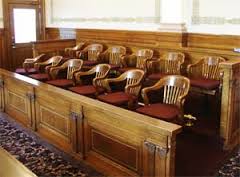
AND THAT’S ALL I HAVE TO SAY ABOUT THAT… FOR NOW.
Was I being too subtle?
Mandelman out.


